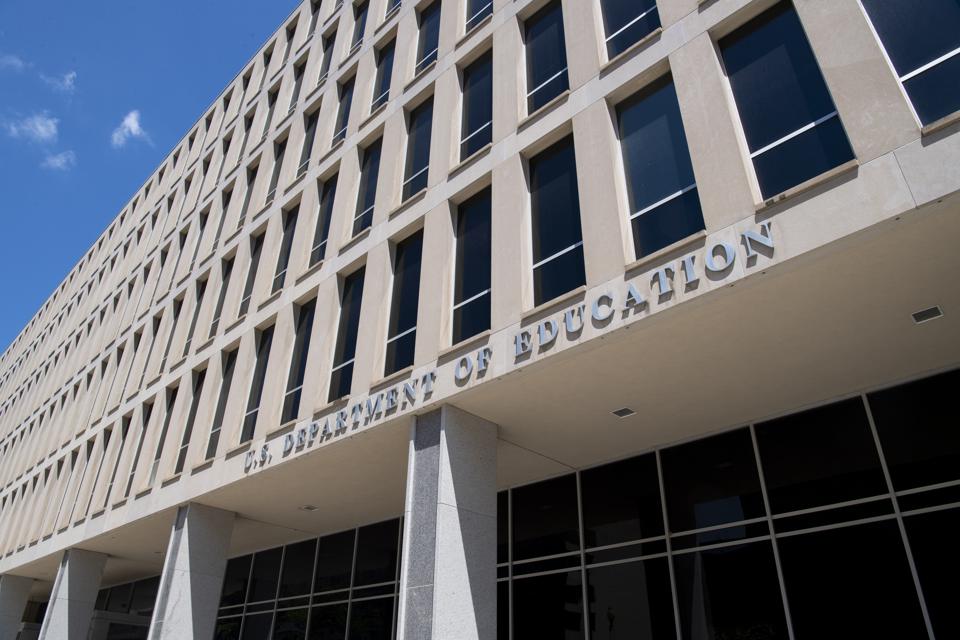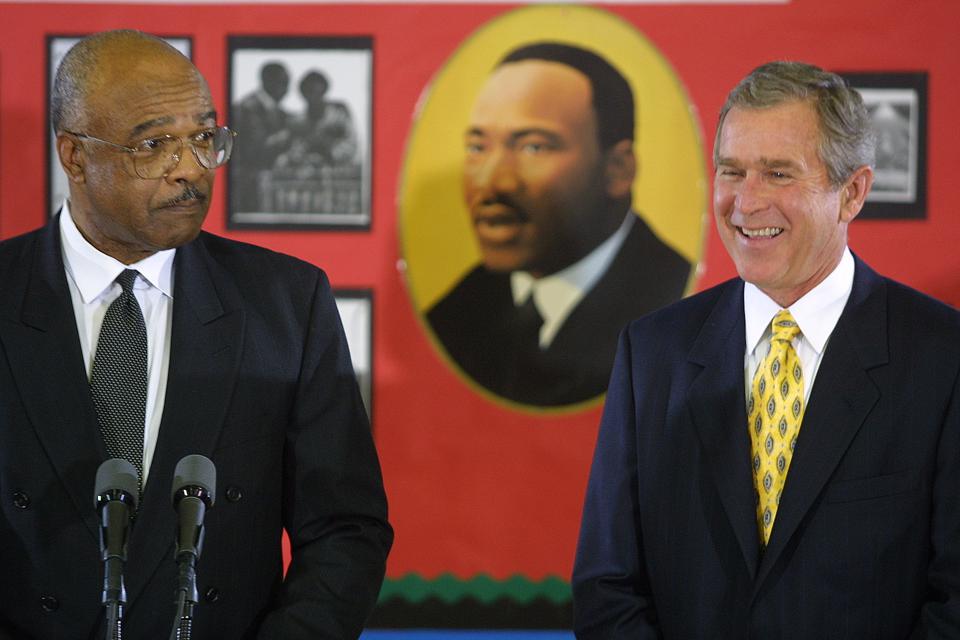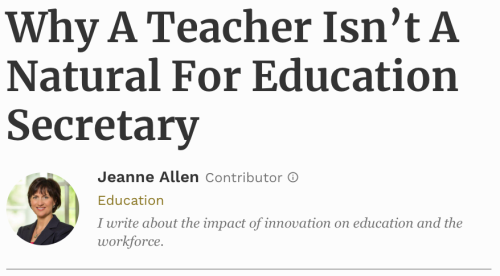Home » News & Analysis » Commentary » Why A Teacher Isn’t A Natural For Education SecretaryGreat Education Should Have No Enemies – Charter Schools In The 2020 Election
Why A Teacher Isn’t A Natural For Education SecretaryGreat Education Should Have No Enemies – Charter Schools In The 2020 Election
The focus should be on learning
November 11, 2020
By Jeanne Allen, Founder and CEO of CER
By Jeanne Allen, Founder and CEO of CER

UNITED STATES – JULY 13: The U.S. Department of Education building is pictured in Washington on Monday, July 13, 2020. (Photo by Caroline Brehman/CQ-Roll Call, Inc via Getty Images)
Joe Biden promised that, if elected president, he would appoint a teacher as U.S. Secretary of Education. The commitment was part of what earned him the support of both teachers unions and hurrahs from a chorus of teachers and teacher advocates, and was offered as a contrast to the often criticized Betsy DeVos.
Beyond picking a teacher, the administration-in-waiting is unofficially floating the idea that said teacher would likely be a current or former union leader. That has the media world ablaze analyzing the repercussions. And many people in their own homes and on their own social media are discussing and arguing the Biden promise: Should a teacher be the next education secretary?
MORE…
Beyond picking a teacher, the administration-in-waiting is unofficially floating the idea that said teacher would likely be a current or former union leader. That has the media world ablaze analyzing the repercussions. And many people in their own homes and on their own social media are discussing and arguing the Biden promise: Should a teacher be the next education secretary?
MORE…
Joe Biden promised that, if elected president, he would appoint a teacher as U.S. Secretary of Education. The commitment was part of what earned him the support of both teachers unions and hurrahs from a chorus of teachers and teacher advocates, and was offered as a contrast to the often criticized Betsy DeVos.
Beyond picking a teacher, the administration-in-waiting is unofficially floating the idea that said teacher would likely be a current or former union leader. That has the media world ablaze analyzing the repercussions. And many people in their own homes and on their own social media are discussing and arguing the Biden promise: Should a teacher be the next education secretary?
The short answer is no, not necessarily. Having been a teacher is not a prerequisite for success as Secretary of Education. The emphasis is wrong. Education is primarily about learning, not teaching, just as having dinner is primarily about eating, not cooking. The process is important, as it can help achieve, and alter, the outcome. But teaching is not the goal of education; it is part of the process. While the two are correlated, and while strong teaching is more likely to yield to successful learning, the unions who are pushing the teacher-as-EdSec notion have argued the opposite holds true—that teaching and learning are not in fact correlated!
Teaching and cooking each require tools and skill. These processes can be enjoyable or a chore, or both. But if dinner is bad, there’s probably a problem with your cooking. Similarly, if education doesn’t yield the intended outcome for schools – educated students – it, too, is a failure. Indeed, today in America we have an issue about which no one seems to be talking in their debates and lofty recommendations about who should be the next Education Secretary – that we are failing (even pre-Covid) by leaps and bounds to ensure the majority of students are successful learners.
In his Education Week commentary, American Enterprise Scholar Frederick Hess has it right when he says that the key attribute of this position is “a willingness to put students first.” Of course, no one is going to say that they don’t put students first. We hear it daily from the heads of the teachers unions even as they are forcing city and state officials to entirely shut down schools despite mounds of scientific evidence that schools are not super-spreaders. Says Hess: “The reality is that Washington is swarming with organizations that represent influential institutions, systems, and employees. There can be great pressure to focus on the care and feeding of these groups. For better or worse, and even when it annoys allies or powerful interests, the secretary needs to be the one steadfastly bringing the focus back to the students in our nation’s schools and colleges.”
It’s About Learning, Not Teaching
Washington is a beast, there’s no question. Regulators re-interpret and mis-interpret the intent of law regularly and an Education Secretary either must intimately understand how that’s done to correct the problem, or have people around her who can do so. But the most important attribute that a successful Education Secretary needs is to be a great learner. The position requires someone who is a great student in the strictest definition of the word, someone who is always open to studying and learning what it takes to be successful, and one who is willing to ask the right questions, be innovative, and not be tied to one way of behaving, simply because your profession demands it.
So who are great learners? Most successful entrepreneurs are, as they must identify and adapt ideas regularly. Innovators are great learners too – they are open to looking at everything differently. Parents are learners of the first degree – they have to lead, follow, and change; they are constantly surprised as they learn each different way a child is moving forward or not and must learn what to do about it, even years after childhood.
But to say that only a teacher should be Education Secretary ignores the vast reality that teachers are rarely in a position to study, review, and understand every innovation, idea, and approach to learning that is being developed and tested in real time as they are working hard in and around the classroom (in-person or not) to instruct students.
Beyond picking a teacher, the administration-in-waiting is unofficially floating the idea that said teacher would likely be a current or former union leader. That has the media world ablaze analyzing the repercussions. And many people in their own homes and on their own social media are discussing and arguing the Biden promise: Should a teacher be the next education secretary?
The short answer is no, not necessarily. Having been a teacher is not a prerequisite for success as Secretary of Education. The emphasis is wrong. Education is primarily about learning, not teaching, just as having dinner is primarily about eating, not cooking. The process is important, as it can help achieve, and alter, the outcome. But teaching is not the goal of education; it is part of the process. While the two are correlated, and while strong teaching is more likely to yield to successful learning, the unions who are pushing the teacher-as-EdSec notion have argued the opposite holds true—that teaching and learning are not in fact correlated!
Teaching and cooking each require tools and skill. These processes can be enjoyable or a chore, or both. But if dinner is bad, there’s probably a problem with your cooking. Similarly, if education doesn’t yield the intended outcome for schools – educated students – it, too, is a failure. Indeed, today in America we have an issue about which no one seems to be talking in their debates and lofty recommendations about who should be the next Education Secretary – that we are failing (even pre-Covid) by leaps and bounds to ensure the majority of students are successful learners.
In his Education Week commentary, American Enterprise Scholar Frederick Hess has it right when he says that the key attribute of this position is “a willingness to put students first.” Of course, no one is going to say that they don’t put students first. We hear it daily from the heads of the teachers unions even as they are forcing city and state officials to entirely shut down schools despite mounds of scientific evidence that schools are not super-spreaders. Says Hess: “The reality is that Washington is swarming with organizations that represent influential institutions, systems, and employees. There can be great pressure to focus on the care and feeding of these groups. For better or worse, and even when it annoys allies or powerful interests, the secretary needs to be the one steadfastly bringing the focus back to the students in our nation’s schools and colleges.”
It’s About Learning, Not Teaching
Washington is a beast, there’s no question. Regulators re-interpret and mis-interpret the intent of law regularly and an Education Secretary either must intimately understand how that’s done to correct the problem, or have people around her who can do so. But the most important attribute that a successful Education Secretary needs is to be a great learner. The position requires someone who is a great student in the strictest definition of the word, someone who is always open to studying and learning what it takes to be successful, and one who is willing to ask the right questions, be innovative, and not be tied to one way of behaving, simply because your profession demands it.
So who are great learners? Most successful entrepreneurs are, as they must identify and adapt ideas regularly. Innovators are great learners too – they are open to looking at everything differently. Parents are learners of the first degree – they have to lead, follow, and change; they are constantly surprised as they learn each different way a child is moving forward or not and must learn what to do about it, even years after childhood.
But to say that only a teacher should be Education Secretary ignores the vast reality that teachers are rarely in a position to study, review, and understand every innovation, idea, and approach to learning that is being developed and tested in real time as they are working hard in and around the classroom (in-person or not) to instruct students.
Like great chefs, some teachers are able to instruct well and succeed. In the best-case scenario, great teachers impart knowledge, correct, coach, and inspire. Ideally, they know a lot about the subject they teach and can help every student, no matter their conditions, to at least grow, if not master the work at hand. Others are not as well-equipped, often compromised by inadequate training, the limitations of their district’s decision-making, and isolation from their field. It’s a big job and it’s a tough job. But even the best teachers do not know what’s happening in another district, let alone a state.

BALTIMORE, MARYLAND – MAY 02: Chef Jose Andres and World Central Kitchen have distributed food to victims of natural disasters as well as the poor and less fortunate in times of crisis. (Photo by J. Countess/Getty Images)
I have seen this personally in teachers I’ve employed and in teachers I’ve taught. They are amazing people – more calm than most, more diligent, more organized, more focused. And their grasp of the political world is fantastically secondary to their work.
Thus the role of policy and politics falls – for better or worse – to union leaders or association heads to monitor the macro-education landscape, and of course, to protect the status quo for their members. And that’s why considering union leaders for Education Secretary is a terrible idea: their focus is on making sure nothing changes adversely for their members. Concern for learners is secondary, if that.
Understanding that relationship is critical to why the individual best suited for that position must be best for students, first. “A teacher should be the secretary” is also a statement that assumes teachers are a monolithic group. They are not. They vary in focus (like the First Lady-elect whose main teaching experience is in a Community College) and vary in teaching environment, from small to large, young kids to older, formally or informally, private or public or home.
But unless they also had experience seeing how differently and uniquely education can be achieved, they will forever succumb – because of the same pressure Hess highlights above – to the interests of organized education groups.
Thus the role of policy and politics falls – for better or worse – to union leaders or association heads to monitor the macro-education landscape, and of course, to protect the status quo for their members. And that’s why considering union leaders for Education Secretary is a terrible idea: their focus is on making sure nothing changes adversely for their members. Concern for learners is secondary, if that.
Understanding that relationship is critical to why the individual best suited for that position must be best for students, first. “A teacher should be the secretary” is also a statement that assumes teachers are a monolithic group. They are not. They vary in focus (like the First Lady-elect whose main teaching experience is in a Community College) and vary in teaching environment, from small to large, young kids to older, formally or informally, private or public or home.
But unless they also had experience seeing how differently and uniquely education can be achieved, they will forever succumb – because of the same pressure Hess highlights above – to the interests of organized education groups.
The Biden Transition Team might consider looking at the example set by Bush Administration Education Secretary Roderick Paige. He was indeed a teacher, but that’s not why he was hired. An African-American who worked his way through segregation and school, Paige had already achieved success in the military and in higher education before becoming the superintendent of the then-failing Houston Independent School District which he turned around. He was open to learning from many different organizations and schools. “Are the students succeeding?” was his constant refrain.

384334 05: Secretary of Education designee Rod Paige introduces President-elect George W. Bush at Kelso Elementary School during a Martin Luther King Jr. holiday event January 15, 2001 in Houston, TX. (Photo by Joe Raedle/Newsmakers)
Once he arrived in Washington, D.C., his door continued to be open to people on the ground and his staff were (mostly) focused on whether the department was functioning for the people. The interest groups and unions loathed him. He didn’t put their interests first.
The modern-day U.S. Department of Education was created in 1979 by President Jimmy Carter as a pay-off for union support. Most of its programs pre-dated the Department’s creation. Some believe the Department should not exist, that it does more harm than good. The real question is: How do transform federal policy and lead the public in understanding what it takes to ensure learners at all levels succeed, knowing that it requires changing the way you’ve always done things?
That’s a question that only a committed learner can answer.
The modern-day U.S. Department of Education was created in 1979 by President Jimmy Carter as a pay-off for union support. Most of its programs pre-dated the Department’s creation. Some believe the Department should not exist, that it does more harm than good. The real question is: How do transform federal policy and lead the public in understanding what it takes to ensure learners at all levels succeed, knowing that it requires changing the way you’ve always done things?
That’s a question that only a committed learner can answer.
Founded in 1993, the Center for Education Reform aims to expand educational opportunities that lead to improved economic outcomes for all Americans — particularly our youth — ensuring that conditions are ripe for innovation, freedom and flexibility throughout U.S. education.
















